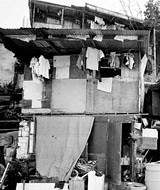KBR, Iraq

[Image: The Al Fatah oil pipeline project, Iraq. The Money Pit (New York Times), 2006]
A must read from the New York Times a few days ago on KBR designed disasters, the bombing of oil pipeline infrastructure, pissing away 5 million dollars a day in leaks, no-bids and dubious contractual immunity, tectonic warfare in the Middle East, shutting out the inspectors, and a miserably wounded gushing Iraqi landscape which, in the end, comes to resemble something like the final scene in Werner Herzog’s film ‘Lessons of Darkness’; his classic musical sweep over the burning Kuwaiti oil fields leftover from the Gulf War, where in the end the contractors who have been fighting to extinguish the raging fires now near completion. “Has life without fire become unbearable to them?” Herzog asks. With a simple flick of a flame, two figures set the fields ablaze, chuckling with cigarettes dangling from their mouths as if to extend their firefighting contracts indefinitely, hijacking the landscape - dousing it to burn it over and over again.
So, when the Army inspectors showed up to inspect construction being done on the banks of the Tigris River outside Baghdad, what they found, James Glanz writes, “that day in July 2004 looked like some gargantuan heart-bypass operation gone nightmarishly bad. A crew had bulldozed a 300-foot-long trench along a giant drill bit in their desperate attempt to yank it loose from the riverbed.” This was a rescue attempt after the company in charge had instructed more drilling even though project crews knew that creating new holes was not possible.
A few weeks later, after the project had burned up all of the $75.7 million allocated to it, the work came to a halt.
In late January, 2004, drilling began. The plan called for boreholes to accommodate 15 pipelines, which would arc beneath the Tigris at shallow angles. Troubles turned up instantly. Every time workers plied the riverbed with their drills, they found it was like sticking their fingers into a jar of marbles: each time they pulled the drills out, the boulders would either shift and erase the larger holes or snap off the bits.

[Image: "The failed project to restore critical pipelines at the Fatah crossing has been a major factor in Iraq's disappearing oil output since the invasion of 2003." - NYT, 2006]
The area had turned out to be a fault zone, where two great pieces of the earth’s crust had shifted and torn the underground terrain into jagged boulders, voids, cobblestones and gravel. It was just the kind of “tectonic” shift that the Fugro report had warned of — hardly the smooth clays and sandstones that KBR had suggested the drillers would find.
The crew abandoned the first borehole and started a second, the inspector general reported. Twenty-six days later, the borehole went through. But the crews found it impossible to enlarge the hole enough for a 30-inch pipe to pass through. By the end of March, five months after arriving in Iraq, they managed to jam a 26-inch pipe through.
The crews would never again get anything larger than that across the riverbed. To make matters worse, the project suffered from constant equipment shortages, just as Mr. Cox, the Army Corps project manager, had predicted.
If KBR had declined to write performance clauses into the drill subcontract, the company had also included language that prevented the crews from speaking directly with the Army Corps, let alone passing along word that some of them knew that the effort was futile.
More Reading:
Lament of the Profiteer (Slate) (Via: MoJo Blog)
ARMY, INC. (The New Yorker)
Attacks 'mar Iraq reconstruction' (BBC)
A Reconstruction Abyss in Iraq (Council on Foreign Relations)
$248M for 150 health clinics, wait make that 20 (Archinect)







0 Comments:
Post a Comment
<< Home